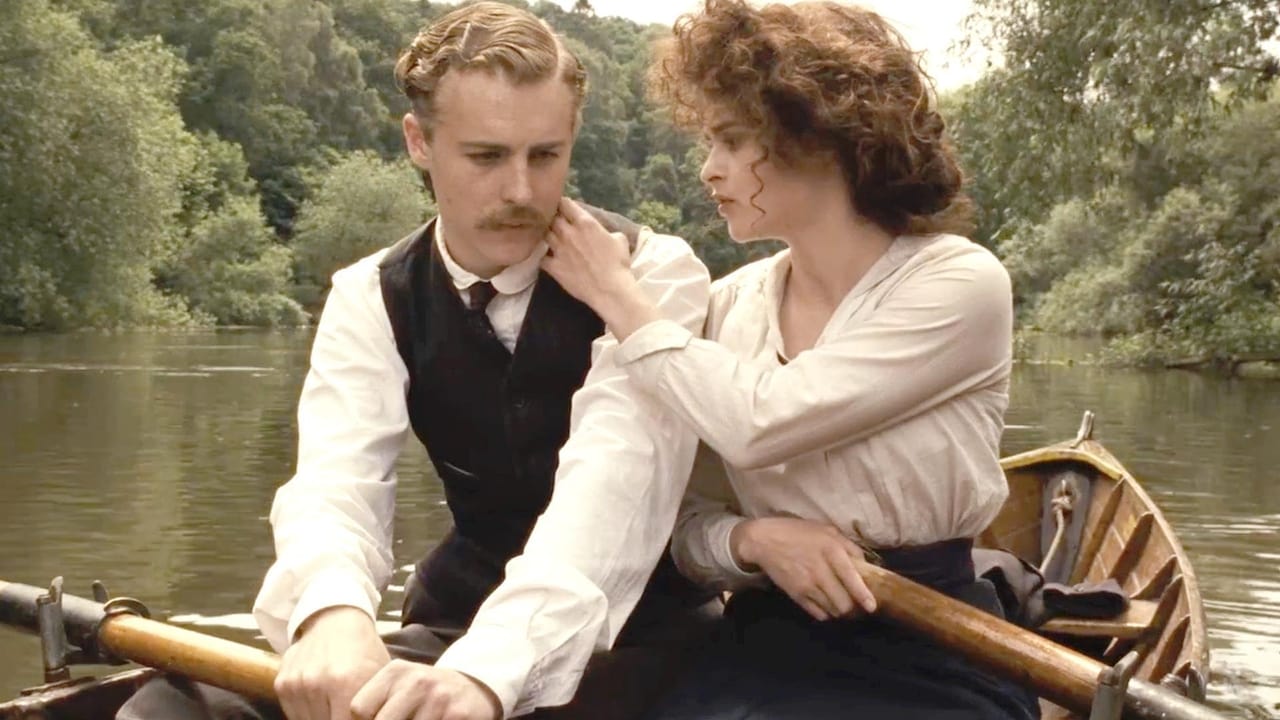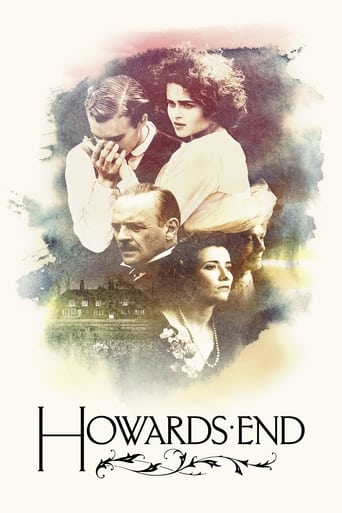

Save your money for something good and enjoyable
... View MoreExcellent, Without a doubt!!
... View MoreAbsolutely amazing
... View MoreAll that we are seeing on the screen is happening with real people, real action sequences in the background, forcing the eye to watch as if we were there.
... View MoreWhat seems on the surface a simple tale of one woman's gift to another is much more complex in this story of one upper class family's involvement with two sisters, not so well off, but obviously of higher morals than some of the members of those who consider themselves everybody else's "betters". The story initially focuses on Helena Bonham Carter's Helen, a middle class lady who is involved with the upper class Joseph Bennett but unable to marry him because of his issues with his family. By chance, Carter's sister Margaret (Emma Thompson) meets the ailing matriarch of Bennett's family (a very subtle and gentle Vanessa Redgrave) who sees something special in the classy Margaret. On her death bed, Redgrave writes in pencil the desire to leave her childhood home, Howard's End, to Thompson, but at a family meeting, widower Anthony Hopkins is manipulated into preventing that by his other son (James Wilby).Encounters on occasion with Thompson brings Hopkins' sudden proposal, perhaps out of loneliness, maybe out of guilt, but within time, growing into love. Carter and Thompson's friendship with a struggling clerk (Samuel West) causes all sorts of issues, especially when West's common wife (Nicola Duffett) comes to a wedding, gets drunk, and reveals a past with Hopkins. This becomes a story then, not only of a family deception, but the ties that bind all mankind, either through obligation, unexpected human interaction or in Hopkins and Duffett's case, a brief lust that tears away at him because of the differences in their social standing. West struggles, not only to try and find a new position after his suddenly ends, but with his feelings for Carter as well and his disgust in his marriage to Duffett. The so-called polite upper class becomes murderous in a shocking twist towards the end, and this explodes into many questions of what exactly is good breeding, and who has it.Powerful performances by a magnificent cast gives this family drama a mesmerizing feel, just as dramatic as all six seasons of "Downton Abbey" whittled down to two and a half hours. There are comic bits here and there that prevent the film from becoming too staid, and the set-up of gentle matriarch Vanessa Redgrave making you care about what happens to her will require the need of Kleenex near by as her light fades and the story moves into new directions. Hopkins, playing a very conflicted man, shows all the human dimensions that makes this character very real, whether grieving over a wife he really didn't spend too much time caring about it seems in life, facing his own ordeal as an adulterer, or unable to forgive himself, both for cheating, keeping the truth away from Thompson and lastly, realizing what a bunch of greedy, selfish offspring he's raised. Prunella Scales is very funny in a small part as Carter and Thompson's no nonsense aunt. Carter and Thompson are wonderfully cast as sisters, and while Thompson has the meatier part, Carter is impressive as well. She's moved on from "A Room With a View" to showing here all the tricks she'll later pull out in her character parts in Tim Burton movies. Thompson, deservedly winning an Oscar, is an actress of such gifts, and from the moment you meet her, she's somebody you'll want as a friend as much as Redgrave did. She faces tragedy with such dignity, being independent and resourceful, yet willing to stand by her man no matter how bad things become because she sees the truths that most humans are blind to. It's the writing surrounding these characters that make "Howard's End" a joy to revisit, and while the country home may not be immense like Downton Abbey, you can see why Redgrave adored it and would only want to see it in the hands of somebody she knew would treasure it like she did.
... View MoreSister Helen Schlegel (Helena Bonham Carter) and Margaret Schlegel (Emma Thompson) are enlightened bourgeoisie. The Wilcoxes are rich and money-obsessed. Helen befriends matriarch Ruth Wilcox (Vanessa Redgrave). On her death bed, Ruth leaves her ancestral home Howards End to Helen who is about to lose the lease to her family home. The note has no date and no signature. Henry Wilcox (Anthony Hopkins) and his children decide to burn the note and ignore Ruth's wishes. The Schlegel sisters take an interest in the poor dreamer clerk Leonard Bast. Later, Henry spends time with Helen and they get married.This is not my type of movies. It's long and slow and meandering. However, there is no denying that there is real craftsmanship here. The acting is superb. The movie looks beautiful. It's showing something about the classes in the era. However, I don't find the characters that compelling. The Schlegels talk too much. The Wilcoxes are too cold. Bast is too bitter. I can't really connect to any of these characters but the movie is still a masterpiece of filmmaking.
... View MoreProducer Ismail Merchant and director James Ivory return, again, to the source of their greatest commercial triumph (E.M. Forster, author of 'Room With A View'), but this time have chosen a novel which doesn't lend itself well to screen adaptation. The customary virtues of other Merchant-Ivory productions are all here: the handsome period setting; a graceful and witty screenplay; tasteful direction and so forth, but every grace note is undermined by Forster's awkward scenario and sometimes labored plotting, often requiring key characters to disappear for long stretches of screen time. In the end Ivory tacitly admits defeat by using portentous slow motion effects to make a dramatic point, a technique best left to Hollywood hacks with music video training. Saving graces include appearances by a luminous Vanessa Redgrave, and Anthony Hopkins showing his true range after being lauded for his one-note performance in 'Silence of the Lambs'.
... View MoreHaving already seen A Room with a View and loving it, I saw Howards End having a feeling it would be good. After seeing it, I absolutely loved it, and think it marginally better than A Room with a View. Directed by James Ivory, produced by Ismail Merchant and written by Ruth Prawer Jhabvala, it is a remarkably faithful adaptation of the novel, and on top of this is also an elegant, nuanced and fascinating film.The period detail is perfect. What I loved about A Room with a View especially was its gorgeous Italian settings. Here it is just as gorgeous, while also having a certain elegance about it. You can never go wrong with beautiful scenery, wondrous costumes and elegant-looking locations, Howards End had all three of those. The music is also a marvel, beautiful, haunting and hypnotic, somewhat reminiscent of a Phillip Glass score, while having a few snatches of Percy Grainger and Beethoven too.The script is very faithful in style to the book and warmth and depth is given to the characters, and the direction is sensitive and nuanced very like how it was in A Room with a View. The plot is quite complex, even on first viewing I found it a little hard to keep up with everything. Then again, this is the sort of film you may need to see more than once. It is quite slow moving, and at over 140 minutes hard to sit through in one sitting, but the period detail, music, screenplay and acting made the film pleasurable, elegant and even moving.Speaking of the acting, the whole cast give very strong performances, while not standing out from one another. Emma Thompson is endearingly-beautiful in Howards End, more beautiful than she looked in Much Ado About Nothing, and gives a moving and spirited portrayal of Margaret. Helena Bonham Carter delivers one of her best ever performances in this film, a performance filled with depth and passion that really wants to make you feel for her character. Vanessa Redgrave while her role is brief still leaves a lasting impression in a characterisation that is moving and wholly relevant, while as the cold Mr Wilcox Anthony Hopkins who a year later would give a brilliant performance in The Remains of the Day(another stylish and nuanced film) shows what a fine actor he is as he gives yet another fine performance. The more minor characters were also very well done, from a spirited Samuel West, whose character Leonard Bast exemplifies the low expectations of the clerking classes, to a suitably serious Jemma Redgrave as Evie Wilcox.Overall, moving, elegant, nuanced and impeccably acted, Howards End is a must see. 9.5/10 Bethany Cox
... View More